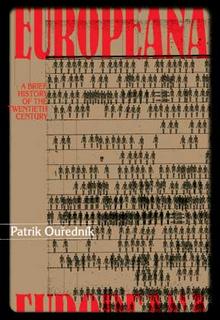
TiVo picked up IFC's new Punk: Attitude documentary for me a week or two ago, and I finally got to it this weekend. Maybe it's the wave of Gabba Gabba Hey nostalgia gently lapping over me that's got me thinking about starting another poetry magazine. I've always had a soft spot for the do-it-yourself attitude of punk, and it has informed my attitude toward the institutions of poetry, if not my aesthetics (sorry, Henry Rollins, but I can't get down with your poems, even though I like your film reviews on IFC).
The big stars for the kids into punk were never the same as the big stars for the square community, so the punk fans, brilliantly, decided to act as if the big stars didn't rate, and their own heroes were the real headliners. Sure, not many people were on board for their projects, but in a society as high-tech and prosperous as ours all you need is the will to do things on your own terms and you can get pretty far: your own zine was easy if you snuck into the photocopy room of your high school or had a pal who'd let you sneak into Kinko's; by the time you got to college you and your pals could let the band crash at your apartment as incentive to let them come to your town on what was somewhat grandiously called their national tour; for a surprisingly small outlay of cash you could just about have your own record label, or at least dub tapes by the dozen. The bulk of people would never care, but all you had to do was not care right back. Which left you more energy to care about unjamming the photocopier in your high school office quietly, so the janitor wouldn't notice you were in there making issue #1 of Prairie Hardcore: the World's Finest Guide to Manitoba's Punk-Rock Scene. (I know, I know, history and the internet have not been kind to the word "hardcore," but back in the day, children, it refered to a kind of music, a special, magical music that could blow the top off of your adolescent head with its ability to channel your rage and skepticism toward vaguely-defined authority figures. Sort of like rap but, you know, not about money). And all you had to give up for this degree of freedom was any chance that any significant number of people would be paying attention — but didn't some guy once give some encouraging words about the relative merit of gaining the whole world and losing your soul?
Anyway. I was in a you-should-get-off-your-ass-and-start-editing-again-because-it-matters-even-though-you-said-you-wanted-to-write-more-instead frame of mind (do the Germans have a word for this?) when I stumbled across Tony Tost's discussion of poetry journals. It's worth a look, but for a summary I'll just crib from Josh Corey's comments. He tells us that Tost sees only two kinds of journals in the poetry world, and that Tost years for something more. Tost, says Corey, defines the two types of journals as:
...the omnibus of "arrival" (here comes the omnibus!) and the mag that seeks to advance a particular aesthetic or communitarian position. I'm sympathetic to his desire for something new, something more self-interrogative, than either existing model seems able to provide. More like a diary in which the entries are written by other people; an unrefereed blog (or e-mail list) will obviously fail to achieve this. What is the guiding principle of such a diarist? Something beyond the merely personal, as Tony says: something more about knowledge and investigation. Investigation of a particular theme or topic would be one way.
I've used slightly different terms when talking to myself about poetry journals (don't worry, peeps, I don't do this out loud, except on the El, late at night, while leaning too close over well-dressed people coming back from the opera). What Tost calls the "arrival" I've called the phone book, simply because such journals show about as much personality as the white pages. The aesthetic/communitarian journal is the one I call the pulpit, although surprisingly few of these journals actually make the position they're advocating explicit in any kind of preachy statement.  Mostly they rely on presenting work from a fairly well defined coterie to make their point. Michael Anania, in one of the brilliant essays in In Plain Sight, points out that while many of these mags have called themselves avant-garde, most are actually more concerned with one or two seminal figures from an older generation, and with their aesthetic progeny, than they are with anything wholly new. They are champions of other-streams, not necessarily of the radically new.
Mostly they rely on presenting work from a fairly well defined coterie to make their point. Michael Anania, in one of the brilliant essays in In Plain Sight, points out that while many of these mags have called themselves avant-garde, most are actually more concerned with one or two seminal figures from an older generation, and with their aesthetic progeny, than they are with anything wholly new. They are champions of other-streams, not necessarily of the radically new.
So. I like Josh & Tony's ideas about what a worthwhile journal would look like, but I still have a hard time thinking about how such a thing would be put together. "Self-interrogatory" and "investigative" are great ideals: they propose the journal as a specific conversation about something in particular among people who all want to get their angle on the topic clear. This is like the pulpit in being focussed, but it is more open-ended, it has no answers in mind, just a few urgent questions to the bottom of which it actually wants to get. To that end, a few (debatable) notions on what would have to go into such a journal. Inevitably, I'll end up saying a few things about my last journal, Samizdat, which ran for ten issues, had some hits and some misses, and has a partially completed website archive of the first seven issues online.
1. Mission.
What does The Iowa Review want to talk about? You really can't tell in this kind of phone-book/omnibus journal. Some of these skew a little more toward the scenic or the indeterminate aesthetic, but in the end they simply aren't meant to be there for the exploration of certain possibilities. Mission doesn't mean party-line, here, but an area to investigate. A topic.
2. Editorial.
Someone — an editor or a group of editors — should take responsibility for the issue, and say something specific about what was chosen and why it is important. (Imagine what the editorials for most phone-book style journals would look like if written honestly: "Billy Collins is in here because he's a big name, we deliberately added some women because we realized that, left to our own devices, we'd have stuck to old white guys, and we took a chance on some of this stuff we don't really understand because we're afraid of appearing unhip. Enjoy!"). I mean, it's a good excercise for the editor, who has to think through his own choices for 700 words or so (Tony and Josh's "self-interrogotory" ideal), and it's good for the readers, who can see whether theory and practice add up, who can agree or disagree, who can get into the conversation. Writing these was my favorite part of editing Samizdat, and the part of the magazine that generated the most mail (fan, hate, and deranged, in roughly equal proportion).
3. Reviews.
I'm stunned at how many journals don't run these. I'm also stunned at how many of the reviews that do get printed are kind of empty, giving little more than a sensibility reacting to a stimulus (like too many poems in this regard). The best reviews, I think, are those that try to put the book into one or another big picture (not necessarily a totalizing picture -- nowadays you'd have to have serious cojones and a good dose of delusion to try that). Group reviews are a good, and underutilized, form for going at this: you get a chance to pull a bunch of strands together, to say "Poet X is good but when you read Poet Y's new book you start to wonder about the task X set for himself. Poet Y does something so much more ambitious, you think of Poet X's work as less interesting somehow." Also, the review that pairs unlikely poets is good, and allows the reviewer to reflect on the nature of the poets' different projects (one of the first reviews we ran in Samizdat paired Reginald Gibbons and Rosemary Waldrop). You need reviews, I think, and you need them to be more than "here are some passages that played over my exquisite sensibilities like a gentle breeze on the strings of an aeolian harp.
4. Probably not a lot of special issues on particular poets.
We ran a few specials for Samizdat: one on Scandinavian poetry (I was living in Sweden), one on John Matthias, and a popular one on Pierre Joris and Jerome Rothenberg. I'm proud of all of these, and I think they're useful resources for people who want to check out the topic, but now I think that this sort of thing is best served through books, archival web sites and that sort of thing. They interupt the flow of discourse, and if a journal is to be a conversation or investigation, it would be a rare special issue that played a big role in that. Maybe one could run a notice or summary of the issue, and then direct people on how to get to it. Don't get me wrong: there are some special issues I really love. But they seem more like books to me, and their focus is often on commemoration more than on the following-up of particular questions.
5. Selection of poems
There should probably be a place for long poems, or whole sequences, serialized if they have to be (we did this with Michael Barrett's "Babylons" in Samizdat because I was such a rookie when I accepted it I didn't realize that it would have maxed out the whole first issue). Also groups of poems that make sense together, or that interrogate one another (as in the reviews of multiple poets above) would be good. And more poems by fewer poets would help to give a journal shape and avoid the "here comes everyone" feel of the journal-as-phonebook.
6. Frequency
This is the tough part. Monthly would be good, or a short journal every two weeks. If people are going to participate in an investigation together, the fat quarterly is less useful than the slim, somewhat casual set of documents that shows up every few weeks. The old French notion of cahiers (workbooks) is a possible inspiration.
7. Independence from institutions
You need this if you aren't going to end up looking over your shoulder at the powers that be, worrying about your funding. Institutional affiliation leads, eventually and almost inevitably, to the occasional or perhaps not so occasional worship of false gods like circulation, respectability and being in step with the norms of "the field." I mean, look at what's become of university presses: designed to publish books that aren't commercial, their editors find themselves worrying about what the university suits will say about low sales.
8. Gemeinschaft
Gemeinschaft, or the idea of a community linked by bonds other than the institutional or administrative, is hugely important for a poetry journal. Phone-book style journals tend not to have it, while Pulpit-style journals sometimes do (sometimes, though, they become too in-groupish, and the jockeying for position becomes something a field biologist specializing in chimpanzees or wolf packs couldn't even unravel). About the worst possible way to staff a journal is to recruit people who have some kind of institutional connection to the mag but very little personal connection or enthusiasm for the journal itself. Too many (but not all) university-based journals end up with a staff of grad students who share only the vaguest of common interests. They're usually given little power and, consequently, don't invest much more in the job than the average convenience store clerk does in his — that is, they may be able to steal some candy (networking with people at similar journals in the hopes of getting some play for what they do care about: their poetry), but by and large they'd rather be elsewhere. About the only journal I know of that is guided by grad students and is really first rate is the Chicago Review,, and I imagine there's a connection between the quality of the magazine and the fact that the powers that be actually let the grad students run the whole show. Given responsibility, they make a real investment in the job. (Oh yeah, there's also the fact that they tend to be PhD students, and have a different set of agendas and concerns than the inhabitants of the ordinary MFA mill).
9. Cultivating a sense that something is going on out there
We've all seen journals that seem to exist in some kind of weird vacuum, as if poems were written in a kind of no-place, as if there weren't a field of poetry (let alone a field of power) with which those poems interact. Back in the eighteenth century, when journals were just getting started, Addison and Steele decided that The Spectator should have regular departments named after the various coffeehouses around London. Each department would cover the kinds of topics you'd find discussed in the hangout for which it was named (one for stock news, one for literary talk, one for "gallantry," etc.). I'm not saying a journal should try to cover the whole world, or even try to cover literature and politics together (as The Potomac has tried to do recently, with mixed results). A column on gallantry among poets would be kind of fun — I've even got a piece I could write on seeing Christian Bok try to pick up women at several readings — but this isn't really what I've got in mind. Rather, part of the "self-interrogating" and "investigative" element of a journal could involve articles and poems that address the situation of poetry in the field as a whole, and in the larger field of power in the world.
So.
How much of this could be accomplished, and what kind of effort it would take, are questions I'm not prepared to answer. Whether a substantial number of people would care is not a question that interests me much, but others might have interesting things to say about that. One question that seems particularly important here is that of just how much of all this the poetry blogs are already accomplishing. Blogs can be updated frequently, are good places for editorials and for reviews (though fewer people than you'd think seem to use them for this), and they're great for carrying on mutual investigations of topics. That's something, and it has got me wondering whether the journal is really the form we need right now. The kid who snuck into the copier room to make his zine loved ink on paper, but hey, when the alternative was a Commodore 64 with a 300 baud modem, who wouldn't?
And as a practical demonstration of the idea of blogs as a good way to carry on self-interrogating investigations of poetry, let me point out some remarks of July 14 by Henry Gould, in which he takes terms from the contingent poetry discussion on this and other blogs and applies them to his own poetry.











